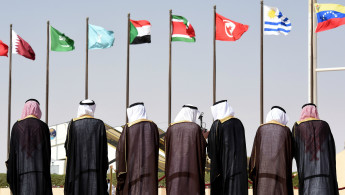Arab, Latin states seek 'just' Palestinian peace
Arab and South American countries have called for a "just and comprehensive" peace between the Palestinians and Israel, at the close of a summit between the two regions.
Their final declaration during the summit on Wednesday, followed weeks-long wave of violence in the region.
The unrest since the start of October has seen 78 Palestinians killed by Israeli forces. Twelve Israelis have also died.
The fourth Summit of Arab and South American Countries emphasised "the need to achieve a just and comprehensive peace to the Palestinian cause", with a state of Palestine based on 1967 borders and with East Jerusalem as its capital.
| The summit emphasised the need to achieve a just and comprehensive peace to the Palestinian cause with a state of Palestine based on 1967 borders and with East Jerusalem as its capital |
The Arab-South American summits, aimed at boosting economic and political ties, was launched in 2005 as an initiative of then Brazilian president Luiz Inacio Lula da Silva.
Numerous heads of state from the 22-member Arab League attended the Riyadh talks but only two of the 12 South American leaders were present.
They were Venezuela's Nicolas Maduro and Rafael Correa of Ecuador, whose nations belong to the Organisation of Petroleum Exporting Countries along with the world's biggest oil exporter, Saudi Arabia.
Senior political officials including Brazil's Foreign Minister Mauro Vieira represented the other Latin delegations for two days of talks.
"We agree on all issues," Vieira told reporters at a press conference with his Saudi counterpart Adel al-Jubeir, who noted the "comprehensiveness" of the final declaration, which spoke of building a "strategic partnership" between the two regions.
The document also called for solutions to the wars in Yemen, Syria and other regional conflicts.
The communique warned of the risks of nuclear proliferation, condemned terrorism, and rejected "associating it with any religion, culture or race".
It also emphasised the Arab and South American states' "full political support" for a United Nations non-binding resolution passed in September on sovereign debt restructuring.
The UN resolution aims to avoid cases like Argentina's years-long battle with American hedge funds following Buenos Aires' debt default in 2001.
Trade volume between the Arab and South American blocs has grown from $6 billion to more than $33 billion over the past decade, Egypt's President Abdel Fattah al-Sisi told the conference.
The summits are known as "ASPA" according to their Spanish and Portuguese acronym. The next meeting will be in Venezuela





 Follow the Middle East's top stories in English at The New Arab on Google News
Follow the Middle East's top stories in English at The New Arab on Google News


